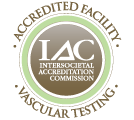When I was asked to write a blog post about vascular surgery, I had to ask myself: what is it that people want to read about? Perhaps I would ask patients what they are interesting in knowing more about. I could also answer their most common questions. Surprisingly, patients rarely ask about details of complicated aortic or revascularization procedures. On the other hand, there is plenty of confusion and curiosity surrounding vein ablation procedures. Let’s discuss that topic but we will only address questions pertaining to laser or radio-frequency ablation of superficial veins in this post.
Q: If I have a superficial vein problem, does that mean I am at risk for deep vein thrombosis (DVT)?
A: Short answer – No.
The deep veins and superficial veins seem like two completely unrelated systems in the body. Even getting a clot in a superficial vein does not significantly increase the risk of DVT. Therefore, a vascular surgeon must adopt a completely different approach to problems with deep veins and superficial veins. Most of the superficial vein procedures are actually geared towards shutting down the vein, when it is actually filled up with the clot.
Q: If I have a clot in the vein, does that mean that I can get a stroke?
A: Short answer – Extremely unlikely.
The superficial vein clots are not prone to “travel” through your body. Very rarely, they may extend into the deep veins, in which case there is a risk for a clot to move. If the deep vein clot moves, or in medical terms, embolizes, it almost always goes to the lungs. There is a small chance that a patient may have an abnormal connection within the heart and the clot travels from the venous side to the arterial. There is an even smaller chance that of all the vessels in the body, a clot will “choose” to go into the carotid artery. In essence, the risk of stroke after a superficial vein procedure is negligible.
Q: If the clot does go to the lungs, isn’t that lethal?
A: Short answer – Very rarely.
Your lungs are extremely adept at filtering out small and medium sized clots from the veins. Most of the pulmonary emboli (clots in the lungs) are silent. Because that risk does exist, we routinely scan veins after the vein ablation procedure to make sure that the clots stay within the superficial veins and do not travel. If a clot protrudes into the deep veins, we start you on a blood thinning medication.
Q: Assuming everything goes as planned and the vein is successfully shut down, how does the blood return from the leg after that?
A: Short answer – Blood is not supposed to travel in those veins anyway.
Of the two types of veins we have in the legs, only one type is functional – the deep veins. The other type is “superfluous”, the superficial veins. Truth be told, there is no clear reason why we even have superficial veins at all, as they do not seem to have any useful function. The normal superficial veins can be used as conduits for a bypass surgery, but the varicose veins are not useful for surgeons, and in fact, are only a source of trouble. Shutting refluxive superficial veins down will actually improve the blood’s return flow, because it eliminates backward flow and unloads the deep vein system.
Q: Once the vein is shut down, isn’t it just going to come back?
A: Short answer – The vein we shut down with laser or radio-frequency usually does not re-open. Most studies demonstrate more than a 90% success rate even after a couple of years. Even if the vein does reopen, it can easily be closed again. What happens more often is that another vein may develop reflux.
Q: How many veins can be shut down?
A: Short answer – The number depends on ultrasound findings; generally up to two veins on each side can be closed.
All superficial veins can be treated, however, only veins with significant reflux should be considered for ablation. We have two main superficial veins on each leg: one on the inside of the thigh and another one on the back of the leg below the knee. Sometimes a parallel branch of the main superficial vein has significant reflux, which may need to be closed as well.
Q: Can the leg edema and tiredness be cured?
A: Short answer – It can be cured; however, usually there are several reasons for edema. Vein closure procedure will certainly help to control swelling.
No matter what causes swelling, compression stockings and leg elevation will provide significant relief. I still advise to use conservative therapy even after successful vein treatment. Another little modification to your lifestyle is to limit your salt intake. Salt causes water retention (as well as hypertension); therefore, reducing sodium levels in your daily diet can make a significant difference.
Q: I have a friend, who has had a dozen procedures and still has leg edema and vein problems returning. It seems that his ordeal never ends; more vein procedures are recommended every time.
A: Short answer – Ask your friend where the procedures were performed. Knowing who the performing physician was may explain the number of procedures done as well as the results.
We don’t know which procedures your friend has undergone—vein ablations, sclerotherapy, or perhaps vein stripping. We also do not know whether the procedures were indicated or not—for instance, were the veins enlarged with significant reflux? Although procedures are technically easy, ask for a Board Certification of the performing physician. It may be the judgment that is lacking, not the mere ability to shut down the vein. The fact that a doctor calls himself or herself a “vein specialist” does not mean that the doctor is specially trained in the field. Only Board Certification testifies to the level of specialization.
The Vascular Experts team has the required training and experience to ensure the best results for your vein ablation procedure.
Please contact Dr. Kucher at tkucher@thevascularexperts.com with any additional questions.
Taras V. Kucher, MD



